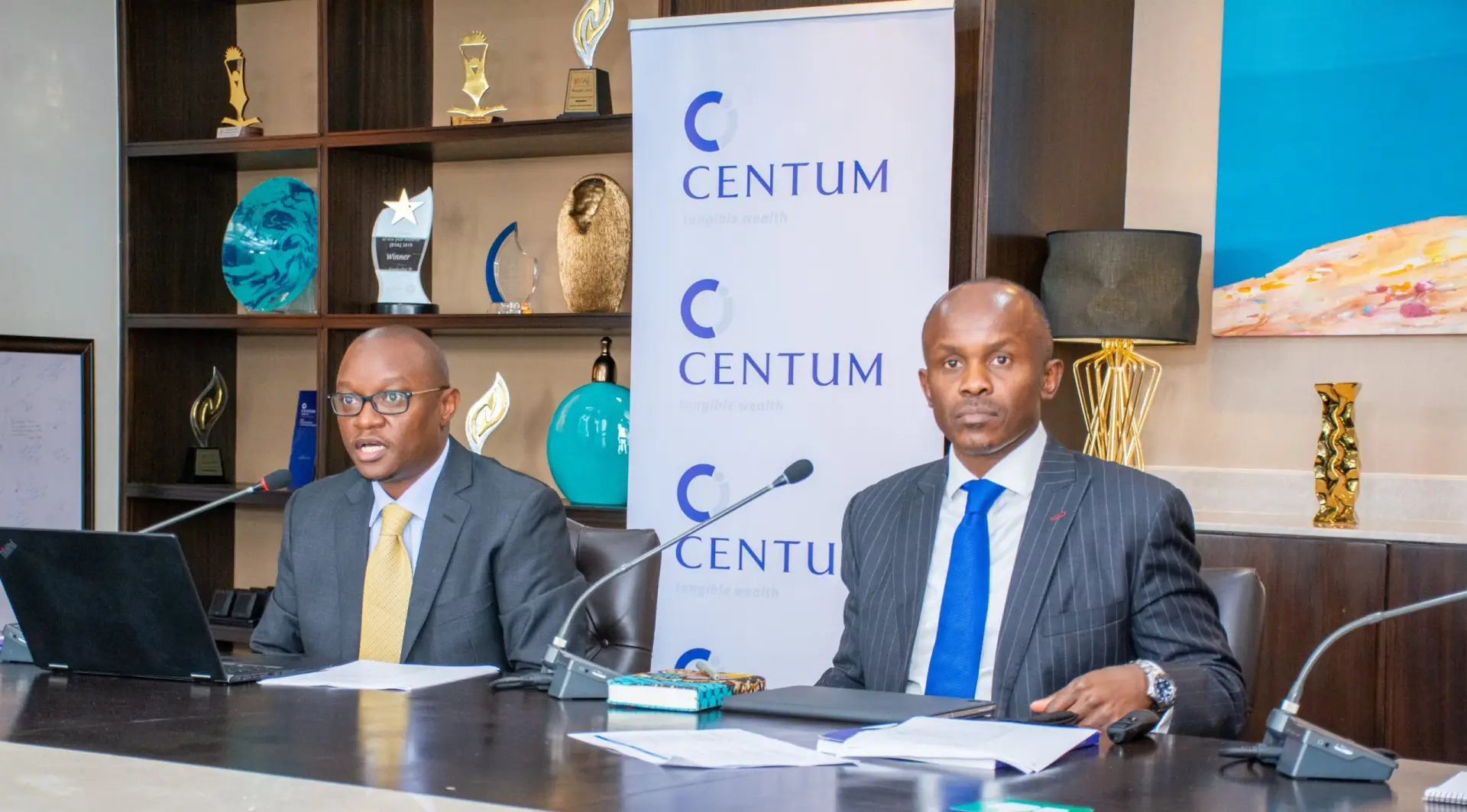East Africa’s leading investment powerhouse, Centum Investment Company PLC, has sent ripples across the regional financial markets with a recent profit warning. The Nairobi-headquartered firm, a diversified investment vehicle with significant stakes across various critical sectors, has projected a substantial 25% decline in net earnings for the financial year that concluded on March 31, 2025. This announcement, made by company secretary Fred Murimi, adheres to the stringent disclosure requirements outlined in Kenya’s Capital Markets (Public Offers, Listings and Disclosures) Regulations 2023, underscoring a commitment to transparency even amidst challenging financial updates.
The Board of Directors at Centum, following a preliminary assessment of its consolidated financials, indicated that the profit after tax is anticipated to fall by at least a quarter compared to the previous financial year. This development, while raising eyebrows, offers a crucial lens through which to examine both Centum’s strategic positioning and the broader economic currents shaping investment prospects in East Africa.
Unpacking the Profit Warning: Fair Value and Accounting Nuances
At the heart of Centum’s projected earnings decline lies a technical accounting nuance rather than a fundamental deterioration of operational performance or cash flow. The company explicitly stated that the anticipated drop is “primarily attributable to lower fair value gains on investment property recorded in FY2025 relative to the previous year.” This explanation is critical for understanding the nature of the profit warning.
The Role of Fair Value Gains on Investment Property
To fully grasp the implications, it’s essential to understand “fair value gains on investment property” and their treatment under International Financial Reporting Standards (IFRS). According to IAS 40 Investment Property, investment property is defined as property (land or a building—or part of a building—or both) held by the owner or by the lessee under a finance lease to earn rentals or for capital appreciation or both. Unlike owner-occupied property, investment property generates cash flows largely independently of other assets held by an entity.
IFRS mandates that companies choosing the fair value model for their investment property must measure it at fair value after initial recognition. A “gain or loss arising from a change in the fair value of investment property shall be recognised in profit or loss for the period in which it arises.” This means that if the market value of Centum’s investment properties (like its vast land banks and developed properties) increases during a financial year, that increase, even if no sale has occurred, is recognized as a non-cash gain in the income statement, boosting reported profit. Conversely, if the revaluation gain is less significant than in a prior period, or if there’s a decline in value, it leads to a lower or negative impact on reported profit.
Centum’s statement clarifies that while sales prices across its subsidiaries have remained stable, the firm “has not booked as significant a revaluation gain as it did in FY2024.” This suggests that while their properties may still be holding value or selling at expected prices, the rate of appreciation, or the revaluation upwards, was simply less pronounced in FY2025 compared to the previous year. This deceleration in fair value gains directly impacts the “profit after tax” figure reported on the income statement, without necessarily reflecting a problem with the underlying operational health or cash-generating ability of the businesses.
Accounting Profit vs. Cash Flow
The firm emphasized that “the drop is largely non-cash and accounting-based, resulting from International Financial Reporting Standards (IFRS) that require annual property revaluations.” This distinction between accounting profit and cash flow is crucial for investors.
- Accounting Profit: This is the net income reported on the income statement, calculated after deducting all expenses (including non-cash items like depreciation and fair value adjustments) from revenues. It’s a measure of profitability based on accrual accounting principles.
- Cash Flow: This refers to the actual money flowing into and out of the business. It’s a measure of liquidity and a company’s ability to generate cash to pay debts, invest, and distribute to shareholders. Non-cash gains or losses from property revaluations do not generate or consume actual cash.
Therefore, while the lower fair value gains will materially impact Centum’s reported profit, they “do not affect cash flows or the operational performance of the company.” This distinction aims to reassure investors that the fundamental operational strength of Centum’s diverse portfolio companies remains intact, and the firm’s ability to generate cash from its core businesses is not compromised by this accounting adjustment. This is a common phenomenon for companies with large real estate portfolios that adopt the fair value model under IFRS.
Centum’s Diversified Portfolio and the “Centum 5.0” Strategy
Centum Investment Company PLC is known for its strategic investments across a wide array of sectors, offering investors access to a diversified portfolio that would otherwise be inaccessible. Centum’s portfolio includes significant holdings in:
- Real Estate: This is a cornerstone of Centum’s assets. Key developments include Two Rivers Mall (an integrated development featuring retail, residential, and commercial spaces in Nairobi), Vipingo Development (a 10,254-acre mixed-use development on the Kenyan coast), and Pearl Marina (a 389-acre development on the shores of Lake Victoria in Uganda). These properties, which include residential units like Two Rivers Duplexes, The Loft, Riverbank, and various apartments in both Kenya and Uganda, are subject to annual revaluations, making this sector particularly sensitive to market shifts in fair value gains. The company’s strategy involves “pursu[ing] market-led infill developments and sale of development rights at significant value uplift.”
- Financial Services: Centum has historically invested in financial institutions. While the original text does not specify current holdings, previous investments have included Sidian Bank (from which Centum exited in September 2024, as per search results, indicating active portfolio management). Centum Capital Partners (CCAP), a wholly-owned subsidiary, manages Centum’s private equity assets, including in the financial services sector.
- Fast-Moving Consumer Goods (FMCG): Centum has sought to invest in companies that serve the growing consumer needs in East Africa.
- Energy Sector: A notable investment identified is Akiira Geothermal, in which Centum made a recent investment in May 2024. This reflects a strategic interest in critical infrastructure and renewable energy sources.
- Other Sectors: Centum’s broad mandate also covers sectors like agriculture, education, healthcare, security services, manufacturing, and information technology. The firm aims to “invest in companies where we can achieve significant value growth and regular cash returns.”
Despite the current profit warning, Centum has reaffirmed its commitment to its long-term value creation plan, dubbed the “Centum 5.0 strategy.” This strategy focuses heavily on value optimization across the investment portfolio. The initiatives under Centum 5.0 are “aimed at delivering sustained, incremental growth in portfolio company performance, which over time is expected to enhance consolidated earnings and shareholder value.” Key tenets of this strategy, as seen in past investor updates, include:
- De-risking projects: By taking projects through the development phase and then pursuing financial close at attractive returns on seed capital.
- Deploying capital through innovative investment structures.
- Institutionalizing robust governance structures and enhancing processes.
- Leveraging networks to grow products and markets.
- Resolving operational challenges within portfolio companies.
- Optimizing capital structures, which includes the recent focus on debt reduction.
The company’s past integrated reports highlight a focus on achieving consistent Net Asset Value (NAV) growth, emphasizing that while accounting gains can fluctuate, the underlying asset base and strategic management are geared towards long-term wealth creation.
East Africa’s Economic and Political Landscape: A Backdrop of Instability
Commercial lawyer and economic analyst Silver Kayondo’s terse remark, “Things are getting real… We need to stabilise our political and economic fundamentals across the board. It is really becoming difficult to create or grow wealth here,” succinctly captures the sentiment of many investors operating in the East African region. His comment reflects a broader understanding of the macroeconomic and geopolitical challenges that can influence investment returns, particularly in sectors sensitive to market sentiment like real estate.
The Macroeconomic and Social Developments in Eastern Africa 2025 report by the UN highlights the region’s resilience but also acknowledges significant headwinds. Key economic challenges impacting East Africa include:
- High Debt Levels: Many East African economies are grappling with increasing public debt, which can limit government spending on infrastructure and social programs, and may lead to higher taxes or tighter fiscal policies.
- Inflation: Persistent inflation erodes purchasing power and increases the cost of doing business. For instance, Kenya’s annual consumer price inflation was 3.6% in March 2025, driven primarily by food and non-alcoholic beverages. While 3.6% is relatively stable, fluctuating food and energy prices can quickly push inflation higher, impacting consumer spending and business margins.
- Currency Fluctuations: Volatile exchange rates can significantly impact the value of investments and the cost of imports, creating uncertainty for businesses with international dealings or those relying on imported raw materials.
- Global Economic Slowdown: The ripple effects of a global economic slowdown can reduce demand for exports from East Africa, impact foreign direct investment inflows, and make external financing more expensive.
- Geopolitical Uncertainties and Trade Tensions: Regional conflicts or global trade disputes can disrupt supply chains, increase operational risks, and deter foreign investment. The African Economic Outlook 2025 notes that despite a projected growth of 5.9% for East Africa in 2025-2026, driven by countries like Ethiopia, Rwanda, and Tanzania, significant challenges persist. Fifteen African countries are facing double-digit inflation, and interest payments consume a substantial portion of government revenue.
These broader economic conditions can directly influence the valuation of investment properties. For example, higher interest rates make borrowing more expensive, which can cool down the real estate market by reducing demand for property purchases and development. Inflation can increase construction costs, while currency depreciation can make imported construction materials more expensive. These factors can lead to property revaluations that are less aggressive or even negative, thereby impacting accounting profits for firms like Centum that apply the fair value model. Kayondo’s statement is a reminder that even strong individual company strategies operate within the confines of broader economic realities.
Implications for Investors and Market Outlook
A profit warning, while potentially non-cash in its accounting nature, always carries significant weight in the financial markets. For investors, it signals a deviation from previous expectations, often leading to a reassessment of a company’s future prospects.
Immediate Market Reaction
Historically, the impact of a profit warning on a company’s stock price can be substantial. Investors may react by selling shares, leading to a sharp decline in the stock price as the market digests the news and adjusts its valuation. This often occurs because a profit warning suggests that the company’s financial performance will not meet analysts’ forecasts, which are typically incorporated into the stock’s valuation. While Centum’s profit warning attributes the decline to non-cash items, the initial market reaction can still be volatile, as some investors may not immediately distinguish between operational setbacks and accounting adjustments.
Investor Confidence and Disclosure Obligations
The issuance of a profit warning, especially for a publicly traded company like Centum, underscores the importance of regulatory compliance. The Capital Markets (Public Offers, Listings and Disclosures) Regulations 2023 in Kenya mandate timely and transparent disclosures to ensure that all investors have access to material information that could affect investment decisions. This regulatory framework aims to protect investors and maintain market integrity by preventing selective disclosure and ensuring that companies promptly inform the public of any significant changes in their financial outlook. Centum’s statement, released by the company secretary, adheres to these obligations, demonstrating adherence to governance standards.
For existing shareholders, a profit warning can be concerning, but understanding the underlying reasons—especially if they are non-cash accounting adjustments related to property revaluations—can help differentiate between temporary dips and fundamental business issues. For potential investors, it presents an opportunity for a revised valuation, potentially allowing for entry at a lower price if they believe in the long-term strategic direction and operational strength of the company.
Future Expectations and Centum’s Path Forward
Centum is expected to publish its full audited results in the coming weeks. These results will provide a comprehensive breakdown of its financial performance, including detailed explanations of the fair value adjustments and the performance of its various subsidiaries. Investors will be keen to see the underlying operational profits and cash flow generation, which Centum assures remain stable.
Despite the dip in reported profit, Centum has explicitly reaffirmed its strategic direction under the Centum 5.0 strategy. This strategy is focused on “value optimisation across the investment portfolio” and initiatives aimed at “delivering sustained, incremental growth in portfolio company performance.” This implies a continued focus on enhancing the profitability and efficiency of its holdings in real estate, financial services, FMCG, and energy. The firm’s recent focus on reducing debt is another positive sign, improving its financial stability and resilience against economic shocks.
The long-term prospects for Centum will hinge on its ability to execute Centum 5.0 effectively amidst the prevailing economic conditions in East Africa. While regional economic challenges like inflation and high debt levels will continue to pose headwinds, East Africa still presents significant growth opportunities driven by a young population, increasing urbanization, and expanding consumer markets. Centum’s diversified approach positions it to capitalize on these opportunities, provided it can navigate the short-term volatilities effectively. The real estate portfolio, while currently impacting accounting profits due to valuation dynamics, remains a significant asset with long-term appreciation potential as the region develops.
Conclusion: A Test of Resilience in a Dynamic Market
Centum Investment Company PLC’s profit warning, while a notable headline, appears to be primarily an accounting reflection of slowed property revaluation gains rather than an indicator of severe operational distress. The firm’s prompt disclosure aligns with modern regulatory expectations, reinforcing transparency in the market.
The situation underscores the inherent volatility in investment property valuations, particularly in dynamic emerging markets like East Africa. It also highlights the critical distinction between IFRS-mandated accounting profits and the actual cash-generating capabilities of a business. As Centum prepares to release its full audited results, the focus will undoubtedly shift to its operational performance and its continued execution of the Centum 5.0 strategy, which aims to deliver long-term shareholder value by optimizing its diversified investment portfolio.
For investors, this period serves as a crucial reminder to look beyond headline figures and delve into the underlying financial health and strategic direction of companies. The East African economic landscape, though fraught with challenges, continues to offer opportunities for strategic investment, and Centum, with its robust portfolio and defined strategy, remains a key player to watch in the region’s evolving investment story. The coming months will be a testament to Centum’s resilience and its ability to turn strategic clarity into tangible returns amidst a complex economic environment.
Ready to take your career to the next level? Join our dynamic courses: ACCA, HESI A2, ATI TEAS 7 , HESI EXIT , NCLEX – RN and NCLEX – PN, Financial Literacy!🌟 Dive into a world of opportunities and empower yourself for success. Explore more at Serrari Ed and start your exciting journey today! ✨
photo source: Google
By: Montel Kamau
Serrari Financial Analyst
30th June, 2025
Article, Financial and News Disclaimer
The Value of a Financial Advisor
While this article offers valuable insights, it is essential to recognize that personal finance can be highly complex and unique to each individual. A financial advisor provides professional expertise and personalized guidance to help you make well-informed decisions tailored to your specific circumstances and goals.
Beyond offering knowledge, a financial advisor serves as a trusted partner to help you stay disciplined, avoid common pitfalls, and remain focused on your long-term objectives. Their perspective and experience can complement your own efforts, enhancing your financial well-being and ensuring a more confident approach to managing your finances.
Disclaimer: This article is for informational purposes only and does not constitute financial advice. Readers are encouraged to consult a licensed financial advisor to obtain guidance specific to their financial situation.
Article and News Disclaimer
The information provided on www.serrarigroup.com is for general informational purposes only. While we strive to keep the information up to date and accurate, we make no representations or warranties of any kind, express or implied, about the completeness, accuracy, reliability, suitability, or availability with respect to the website or the information, products, services, or related graphics contained on the website for any purpose. Any reliance you place on such information is therefore strictly at your own risk.
www.serrarigroup.com is not responsible for any errors or omissions, or for the results obtained from the use of this information. All information on the website is provided on an as-is basis, with no guarantee of completeness, accuracy, timeliness, or of the results obtained from the use of this information, and without warranty of any kind, express or implied, including but not limited to warranties of performance, merchantability, and fitness for a particular purpose.
In no event will www.serrarigroup.com be liable to you or anyone else for any decision made or action taken in reliance on the information provided on the website or for any consequential, special, or similar damages, even if advised of the possibility of such damages.
The articles, news, and information presented on www.serrarigroup.com reflect the opinions of the respective authors and contributors and do not necessarily represent the views of the website or its management. Any views or opinions expressed are solely those of the individual authors and do not represent the website's views or opinions as a whole.
The content on www.serrarigroup.com may include links to external websites, which are provided for convenience and informational purposes only. We have no control over the nature, content, and availability of those sites. The inclusion of any links does not necessarily imply a recommendation or endorsement of the views expressed within them.
Every effort is made to keep the website up and running smoothly. However, www.serrarigroup.com takes no responsibility for, and will not be liable for, the website being temporarily unavailable due to technical issues beyond our control.
Please note that laws, regulations, and information can change rapidly, and we advise you to conduct further research and seek professional advice when necessary.
By using www.serrarigroup.com, you agree to this disclaimer and its terms. If you do not agree with this disclaimer, please do not use the website.
www.serrarigroup.com, reserves the right to update, modify, or remove any part of this disclaimer without prior notice. It is your responsibility to review this disclaimer periodically for changes.
Serrari Group 2025
















